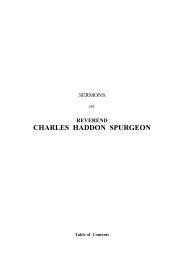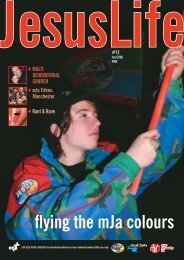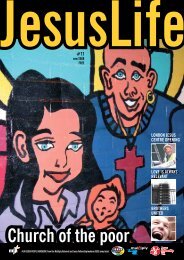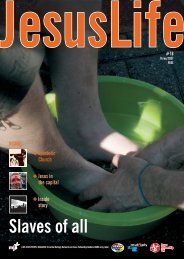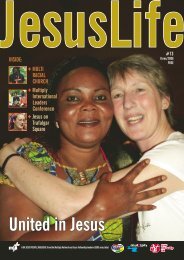Life of William Carey by George Smith - The Jesus Army
Life of William Carey by George Smith - The Jesus Army
Life of William Carey by George Smith - The Jesus Army
You also want an ePaper? Increase the reach of your titles
YUMPU automatically turns print PDFs into web optimized ePapers that Google loves.
lunted the natural shrewdness <strong>of</strong> the cultivator. A foul mythology, a saddening demon-worship, and an exacting<br />
social system, covered the land as with a pall. What even Christendom was fast becoming in the tenth<br />
century, India had been all through the eighteen Christian centuries.<br />
<strong>The</strong> boy who from eight to fourteen “chose to read books <strong>of</strong> science, history, voyages, etc., more than others”;<br />
the youth whose gardener uncle would have had him follow that calling, but whose sensitive skin kept him<br />
within doors, where he fitted up a room with his botanical and zoological museum; the shoemaker-preacher<br />
who made a garden around every cottage-manse in which he lived, and was familiar with every beast, bird, insect,<br />
and tree in the Midlands <strong>of</strong> England, became a scientific observer from the day he landed at Calcutta, an<br />
agricultural reformer from the year he first built a wooden farmhouse in the jungle, as the Manitoba emigrant<br />
now does under very different skies, and then began to grow and make indigo amid the peasantry at Dinapoor.<br />
He thus unconsciously reveals himself and his method <strong>of</strong> working in a letter to Morris <strong>of</strong> Clipstone:<br />
“MUDNABATI, 5th December 1797.--To talk <strong>of</strong> continuance <strong>of</strong> friendship and warm affection to<br />
you would be folly. I love you; and next to seeing your face, a letter from you is one <strong>of</strong> my<br />
greatest gratifications. I see the handwriting, and read the heart <strong>of</strong> my friend; nor can the distance<br />
<strong>of</strong> one-fourth <strong>of</strong> the globe prevent a union <strong>of</strong> hearts.<br />
“Hitherto I have refrained from writing accounts <strong>of</strong> the country, because I concluded that those<br />
whose souls were panting after the conversion <strong>of</strong> the heathen would feel but little gratified in<br />
having an account <strong>of</strong> the natural productions <strong>of</strong> the country. But as intelligence <strong>of</strong> this kind has<br />
been frequently solicited <strong>by</strong> several <strong>of</strong> my friends, I have accordingly opened books <strong>of</strong> observation,<br />
which I hope to communicate when they are sufficiently authenticated and matured. I also<br />
intend to assign a peculiar share to each <strong>of</strong> my stated correspondents. To you I shall write some<br />
accounts <strong>of</strong> the arts, utensils, and manufactures <strong>of</strong> the country; to Brother Sutcliff their mythology<br />
and religion; to Brother Ryland the manners and customs <strong>of</strong> the inhabitants; to Brother<br />
Fuller the productions <strong>of</strong> the country; to Brother Pearce the language, etc.; and to the Society a<br />
joint account <strong>of</strong> the mission.”<br />
He had “separate books for every distinct class, as birds, beasts, fishes, reptiles, etc.” Long before this, on 13th<br />
March 1795, he had written to the learned Ryland, his special correspondent on subjects <strong>of</strong> science and on<br />
Hebrew, his first impressions <strong>of</strong> the physiography <strong>of</strong> Bengal, adding: “<strong>The</strong> natural history <strong>of</strong> Bengal would<br />
furnish innumerable novelties to a curious inquirer. I am making collections and minute descriptions <strong>of</strong><br />
whatever I can obtain; and intend at some future time to transmit them to Europe.”<br />
“MUDNABATI, 26th November 1796.--I observed in a former letter that the beasts have been in<br />
general described, but that the undescribed birds were surprisingly numerous; and, in fact, new<br />
species are still frequently coming under my notice. We have sparrows and water-wagtails, one<br />
species <strong>of</strong> crow, ducks, geese, and common fowls; pigeons, teal, ortolans, plovers, snipes like<br />
those in Europe; but others, entirely unlike European birds, would fill a volume. Insects are very<br />
numerous. I have seen about twelve sorts <strong>of</strong> grylli, or grasshoppers and crickets. Ants are the<br />
most omnivorous <strong>of</strong> all insects; we have eight or ten sorts very numerous. <strong>The</strong> termes, or white<br />
ants, destroy everything on which they fasten; they will eat through an oak chest in a day or two<br />
and devour all its contents. Butterflies are not so numerous as in England, but I think all different.<br />
Common flies and mosquitoes (or gnats) are abundant, and the latter so tormenting as to<br />
make one conclude that if the flies in Egypt were mosquitoes, the plague must be almost insupportable.<br />
Here are beetles <strong>of</strong> many species; scorpions <strong>of</strong> two sorts, the sting <strong>of</strong> the smallest not<br />
mortal; land crabs in abundance, and an amazing number <strong>of</strong> other kinds <strong>of</strong> insects. Fish is very<br />
plentiful, and the principal animal food <strong>of</strong> the inhabitants. I find fewer varieties <strong>of</strong> vegetables<br />
136



